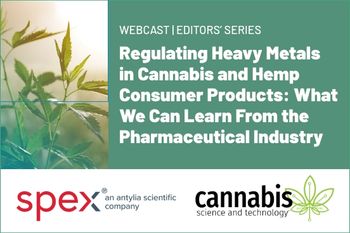
The two new triploid seeds made their debut after several years in the making.


The two new triploid seeds made their debut after several years in the making.

An East Coast cannabis farm receives recognition from the third-party nonprofit for its regenerative growing methods.

Join us for Part IV of this multipart interview series where we dive into the complexities of state cannabis grow laws with the non-profit, Cannabis Patients Pacific Northwest.

In this article, we dive deeper into the physical, cellular, and molecular adaptions that plants demonstrate in response to light intensity and spectrum.

Jamie Tuinstra, product manufacturer at Modine Manufacturing, sits down with Cannabis Science and Technology in an informative interview where he discusses how heat exchanger technology can help support energy efficiency, the equipment his company featured at the Cannabis Science Conference Fall 2023, and challenges heaters need to overcome with cannabis cultivation.

A new research project seeks to develop hemp varieties tailored to different latitudes.

The three-year study tested hemp’s potential to benefit or harm vineyards.

How can greenhouse cultivators improve profitability by installing high-efficiency heating systems to reduce energy costs?

As the legal recreational cannabis industry expands, regulators and safety watchdogs are taking a closer look at how the industry polices itself.

Cannabis Science Conference Fall was held in Providence, Rhode Island from September 20-22, 2023. Here we provide highlights from this exciting event.

As cannabis reform and acceptance expands in the US, so does its impact on the environment. In the rapidly evolving landscape of cannabis cultivation, one organization is looking toward more sustainable and ethical approaches to cannabis growing. Launched in 2019, Sun+Earth Certified is a nonprofit, third-party certification for organic cannabis, supported by a community of growers and educators advocating for regenerative cannabis farming practices to benefit local and global communities. In this interview, Heather Dunbar, Director of Marketing and Communications, shares her journey into the cannabis industry, the vital role of Sun+Earth Certified in reshaping cannabis cultivation practices, and the organization's vision for a more environmentally conscious and socially responsible future.

In this new interview series, we sit down with several speakers from 2023 Cannabis Science Conference events to learn about their expertise and backgrounds in the cannabis industry. Join us to learn more about Dr. Peter Grinspoon, Jini Glaros, Dr. Miyabe Shields, and Adam Jacques.

What is ethalfluralin and what does this herbicide have to do with growing hemp?

This column reviews a study published by cannabis industry design and construction professionals and describes the impact of energy regulations affecting heating, ventilation, and air conditioning (HVAC) system selection in cannabis production facilities.

This article delves into the aspects of horticultural light intensity and spectra as well as their relative influence on cannabis photosynthesis, photomorphogenesis, and overall yield.

See the program overview for the upcoming Cannabis Science Conference Fall in Providence, Rhode Island September 20-22nd.

Growing cannabis, both indoors or outdoors, impacts the environment in several significant ways and one challenge of today’s cultivators is to consider how to lessen the negative effects of overwatering, pesticides, energy usage, and plastic pollution.

The cannabis industry is evolving at a rapid rate. Growers are all looking for ways to produce the most profitable crops in an industry that lacks standardization and guidelines. One tool that has been beneficial in cannabis cultivation is vapor pressure deficit (VPD), which has been found to be very important for how nutrients are transported throughout the plant. Here, Hannia Mendoza-Dickey, University of Texas at El Paso, Department of Chemistry and Biochemistry; Robert Manes, Curtis Mathes Corporation; and Zacariah L. Hildenbrand, University of Texas at El Paso, Curtis Mathes Corporation, discuss the significance of VPD, why the cannabis industry is moving forward with this process, and a preview of their upcoming article titled “Intensity and Spectrum: The Role of Lighting in Vapor Pressure Deficit.”

Cannabis Science Conference Spring was held in Portland, Oregon from April 19-21, 2023. Here we provide a few highlights from the event.

Webinar Date/Time: Thu, Jun 29, 2023 11:00 AM EDT

Cal Poly Humboldt plans a two-year community-based study on the plant genetics and history from legacy cannabis communities in the state.

This article provides insights into the opportunities involving the genetic modification of cannabis.

One important element of creating the ideal growing environment for cannabis is often overlooked: air quality. Here, we look at why this is important as well as best practices for mitigating poor air quality.

Hop latent viroid and black root rot are affecting the growth of cannabis plants across the United States as well as other countries.

How much does hemp live up to its advertised potential as a versatile, sustainable crop and what is blocking its path to realizing its full abilities?